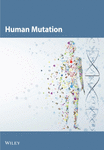Mutation of the hMSH2 gene in two families with hereditary nonpolyposis colorectal cancer
Abstract
We examined 18 unrelated individuals who have colorectal cancer or cancers associated with the HNPCC syndrome and have a family history of cancer for mutations in exon 13 of the hMSH2 gene. Two of the 18 individuals had the same previously unreported single-base deletion in codon 705 of hMSH2, resulting in a frame-shift mutation. Two other individuals had a T-to-C base change in the intron sequence at −6 position of the splice acceptor site at the 5′ end of exon 13 which has previously been reported to be a polymorphism found in normal individuals (Leach et al., 1993). Nucleotide sequence changes were not detected in the remaining 14 individuals. We examined DNA from additional family members of the two subjects with codon 705 mutations. Of these, two individuals were identified with the mutation who were older than 50 years and who are apparently cancer free. The occurrence of breast cancer in both families (including one individual with a confirmed codon 705 mutation) suggests that breast cancer may be a part of the HNPCC syndrome. This is the first study to describe mutations in the hMSH2 gene in families that do not fit the definition of HNPCC. Because both families with the mutations at codon 705 failed to meet the Amsterdam criteria for HNPCC (Vasen et al., Dis Colon Rectum 34:424–425, 1991), our findings suggest that these criteria should now be reconsidered for purposes of diagnosis of HNPCC. © 1996 Wiley-Liss, Inc.




